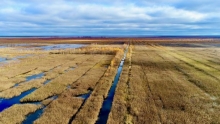A year ago, fewer than 2% of those admitted to McGill’s Faculty of Medicine and Health Sciences (one of the top medical schools in the country) were Black. A typical incoming class had fewer than 5 Black students, a situation that has existed for many years. “When I was younger and thought about working in medicine, I didn’t think it was possible. You just didn’t see doctors who looked like me,” recalled Victoire Kpadé, who graduated from McGill’s undergraduate medical program in the spring of 2022.


A student-led art exhibition on Feb. 23 is shedding light on Black artistry, talent and culture at McGill University. Organized by Welly Minyangadou Ngokobi, a graduate student in the Department of Integrated Studies in Education, ‘See us, Hear us, Learn from us,’ aims to let students take the lead in teaching the exhibition’s visitors about the history, culture and future of Black people. “This is not a talk. This is not a workshop.

Many of the details surrounding the recent fatal police beating of Tyre Nichols in Memphis, Tenn., are still unknown or disputed. Yet in many ways, all you need to know is how the encounter started: With Nichols expressing confusion as to why he had been stopped, and one officer replying that he would attack Nichols.

About 250 million years ago, the Permian-Triassic mass extinction killed over 80 per cent of the planet's species. In the aftermath, scientists believe that life on earth was dominated by simple species for up to 10 million years before more complex ecosystems could evolve. Now this longstanding theory is being challenged by a team of international researchers – including scientists from McGill University and Université du Québec à Montréal.

Wetlands are among the most threatened ecosystems in the world. A new study, published in Nature, has found that the loss of wetland areas around the globe since 1700 has likely been overestimated. This is good news overall, however, the global picture hides significant variations, with several regions and distinct wetland types under significant levels of pressure. For instance, temperate river floodplains have been highly impacted while remote boreal-arctic peatlands remain comparatively unharmed.

How does our own identity impact how we perceive and judge others? Research from McGill University has found that those who are most likely to be stereotyped based on their combined racial and gender identity, such as Black women and Asian men, were less likely to hold certain stereotypes against others.

Snakes and mice don’t look alike. But much of what we know about skin colouration and patterning in vertebrates generally, including in snakes, is based on lab mice. However, there are limits to what mice can tell us about other vertebrates because they don’t share all of the same types of colour-producing cells, known as chromatophores. For example, snakes have a type of chromatophore called iridophores that can generate iridescent colours by reflecting light.

Teen vaping has been on the rise, with reports of rapidly increasing use across North America. While some consider vapes to be a useful tool for smoking cessation, new research from the Research Institute of the McGill University Health Centre (RI-MUHC) supports a growing public health concern about potential adverse health consequences.

Lung cancer is the leading cause of cancer-related deaths in Quebec and Canada, killing more individuals than prostate, colon and breast cancers combined. Thanks to tissue samples from almost 500 lung cancer patients, a group of researchers from McGill University and Université Laval were able to identify those who were likely to have a cancer recurrence and require further treatment post-surgery.

Every day, humans breathe in 11,000 litres of air. But this essential act also means we inhale microorganisms, particles, and pollutants. A new study from the Research Institute of the McGill University Health Centre (RI-MUHC) has revealed how the unique immune cells that are developed in the embryo protect our lungs from environmental challenges throughout the course of our lifetime.

For professional athletes, the pressures of competition and stigma surrounding mental health issues can be debilitating to the point where some are leaving the arena for good. Young hockey players are no exception. Fear of negative career repercussions can mean athletes avoid disclosing their mental health concerns.

Indigenous communities across the globe are fighting to retain their languages, which serve as means through which cultures, knowledge and traditions are preserved and transmitted between generations.

If you could redesign high school, what might you change? Like most educational institutions across Canada, Montreal’s English high schools retain structures from the time of the industrial revolution. As the realities of students’ lives have transformed, schools are slowly adapting to a knowledge-based economy and unpredictable ecological and social challenges.

A new report by McGill University Faculty of Education researchers shows Canadian Mental Health Association (CMHA), Ontario’s Talk Today program is making a positive impact on athletes in the Canadian Junior Hockey League (CJHL).

What drives crocodile evolution? Is climate a major factor or changes in sea levels? Determined to find answers to these questions, researchers from McGill University discovered that while changing temperatures and rainfall had little impact on the crocodiles’ gene flow over the past three million years, changes to sea levels during the Ice Age had a different effect.
